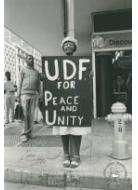The extent to which women are organised is a barometer of the level of struggle as a whole'
On the 20th August 1983 the United Democratic Front (UDF) was formed. At its launch in Cape Town, both Alan Boesak and Frances Baard made impassioned speeches which provided inspiration to the 15,000 people who attended.
The UDF believed strongly in the principle of non-racialism and supported the ideals of the Freedom Charter. It brought together over 600 different smaller organisations as affiliates. This meant that these smaller organisations were officially attached to the UDF and supported its ideals.
Women played a central role in the structures of the UDF as well as in the day-to-day campaigns that the UDF became involved in, including the UDF's Million Signatures Campaign. Albertina Sisulu was elected as one of the three co-presidents, even though she was in jail at the time of the election.
The UDF Women's Congress, made up of women from all affiliate organisations including women's co-operatives and church groups, was formed to uphold the values outlined in the Freedom Charter and the Women's Charter which were drafted in the 1950s. The mandate was to find and implement ways in which to deal with discrimination and all forms of prejudices against women.
Exhibitions in the classroom
Reading the past
SOURCE: ‘UDF Resolution on Women’, 1983.
This resolution was a call for unity of women by drawing women’s organisations into UDF structures.
Read the resolution and answer the questions.
1. ‘The extent to which women are organised is a barometer of the level of struggle as a whole.’
Do you agree with this statement from the resolution? Explain your answer.
2. What was the UDF Resolution on Women trying to achieve in terms of women in the struggle?
Learning more
To learn more about the formation of the UDF, consult ‘The UDF and the National Forum’ booklet in the SAHA in the Classroom series that uses primary sources to explore South African history 1976 - 1994.






